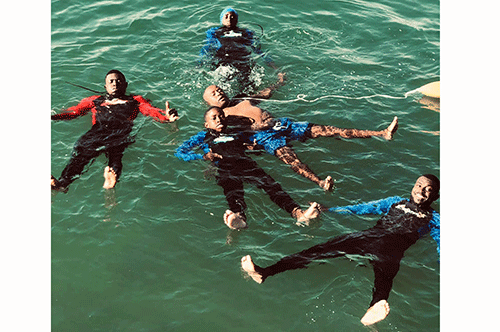As Namibians head to their festive holiday destinations, many are attracted to the seaside to enjoy times with family and loved ones.
Water safety expert Jonas Sheyavali told this publication that drowning incidents continue to be a cause for concern as the number gradually increases with children swimming unsupervised becoming a major concern. “About 25 people drowned this year in Namibia from January to December. Twenty of these were male, three females while 11 children under 18 were among the fatalities. Additionally, alcohol-related drownings decreased to zero this year so far, while we came across three drowning incidents linked to suicide,” he detailed.
The educator added that the bodies of water that accounted for the most drowning deaths in 2024 are the sea and rivers with both seven fatalities. About 15 drowning fatalities were recorded in 2023 with more than 70% of drowning deaths this year being young people under the age of 18. “Erongo region experienced the highest drowning resulting in 10 fatalities followed by Kavango East with four. Overall, we have also seen three double drownings – where people trying to rescue others and end up drowning themselves.
Seven people drowned while swimming for leisure and eight children drowned while they were playing unsupervised,” Sheyavali said.
Other causes of drowning include the capsizing of boats, falling of persons into ponds unintentionally, vehicles falling into the water/sea, fishing and others. He said as a developing country, there is a need to invest more in empowering the nation with swimming skills and rescuing skills.
“We can successfully do this by learning from developed countries. Let us invest more in early childhood development and teach our children how to swim. In my experience and understanding, water should be respected. We should never underestimate the power of water and nature. Everyone can drown – but no one should,” he highlighted.
Sheyavali said people who are at risk of drowning include but are not limited to pre-teens, adding that they have come across aquatic accidents where professional swimmers have also drowned.
“Alcohol-related drownings decreased while suicide-related drownings increased. Gender-based related drowning – male perception of risk management puts males at high risk of drowning.
Additionally, peer pressure related drowning is most common in teenagers with those trying to impress friends and family,” he stated.
Frans Nekundi, a sustainable ocean and aquaculture management noted that the increasing number of drowning incidents and suicide cases occurring at the beaches and on the jetty paints a distressing picture of negligence. “This year alone, the number of lives lost at sea is alarming.
Several cases have been reported of people drowning and there are concerning reports of people jumping from the jetty,” stated Nekundi in an OPED published in one of the dailies recently. He added that shockingly, there is no visible, active presence of lifeguards on duty to respond to such emergencies.
“When accidents happen, the response time is often delayed, as rescuers have to come from within the town, by which time it is often too late to save lives,” he noted.
Nekundi added: “For a town like Swakopmund, such incidents not only tarnish Namibia’s reputation but also raise critical questions about public safety and crisis management.
If urgent action is not taken, this neglect would discourage visitors, harm the local economy, and undermine our pride in our coastal towns.”
He strongly urged the Swakopmund municipality to implement measures like deploying active lifeguards, saying that trained lifeguards should be stationed at strategic points along the beaches and jetty areas, especially during peak hours and tourist seasons.
“Install safety barriers and warning signs: The jetty should have appropriate barriers and clear signage to prevent accidental falls or unauthorised access to high-risk areas. Emergency response units: Establish a dedicated, rapid-response team stationed near the beach to handle emergencies promptly,” he advised. He said these and other measures are not merely about addressing a problem, but preserving lives, fostering a culture of safety and safeguarding the reputation of Namibia as a world-class destination. -psiririka@ nepc.com.na



